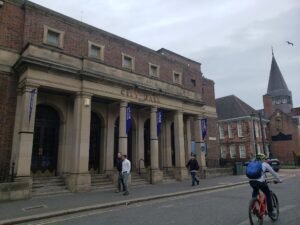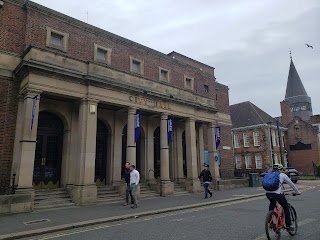City Hall
Walking the streets of Newcastle yesterday, I came to the old City Hall. To call it ‘old’ does not mean that it is particularly ancient; it opened in 1927, which, for the standards of central Newcastle, is mature, but not that aged. Nor does it mean that there is a new one to replace it – not formally, at least. In musical terms, City Hall is an old venue because many of the events that used to take place there are now put on in the modern, scenic and altogether more glamorous Sage Gateshead.
Since its opening in December 2004, Sage Gateshead has developed a high profile, attracting the artists and the punters that would formerly have come to City Hall – and more, many more artists and many more punters. The river views make going to Sage Gateshead an even more attractive, aesthetically meaningful experience.
Not much hope left for City Hall, it would seem. And yet, it is still standing. It has survived threats of closure and it has outlived the City Baths nextdoor. It now calls itself 02 City Hall Newcastle and its descriptions of itself defiantly define it as a concert hall.
Seeing it out of the blue yesterday, I was reminded of Mauricio Kagel’s delight when he was my guest to attend the performance of a work of his at Ulster Hall in Belfast in 1993. He said words to the effect that these old halls were the heart of a city’s music: good acoustics, central location, a sense of history. Why replace them?
Seeing it out of the blue yesterday, I was reminded of Mauricio Kagel’s delight when he was my guest to attend the performance of a work of his at Ulster Hall in Belfast in 1993. He said words to the effect that these old halls were the heart of a city’s music: good acoustics, central location, a sense of history. Why replace them?
In the late 1990s and early 2000s City Hall was a weekly stop for me. The concerts of Northern Sinfonia – yes, this was before it was awarded its royal appellation – took place there, I believe, almost always on a Friday evening. I remember some extraordinary ones, including one conducted by Gennadi Rozhdestvensky.
For me the strongest memory is the Newcastle première in 2000 of my Approaching Melmoth for baritone, choir and orchestra. The commission had come from Northern Sinfonia’s then executive director, John Summers, before he left to direct the Hallé Orchestra in Manchester. The management recruited an excellent team including none other than Sir Thomas Allen in the solo part and the conductor Nicholas Cleobury. The management also asked me what piece would go well with mine in the programme, and my suggestion of Bach’s Cantata No. 4 was accepted. I had time to reflect on that choice and to build in connections to it in my own piece.
After a pre-première in Carlisle which took the edge off everybody’s nerves, the team gave a confident, hugely committed performance at City Hall. By comparison with other premières I’ve been blessed with, say, at Lincoln Center or in those fabulous new halls in Spain, this was perhaps not the most glamorous of settings, but the piece was one of my strongest, the team was hard to surpass and the audience responded with enthusiasm.
One of the best musical memories.

